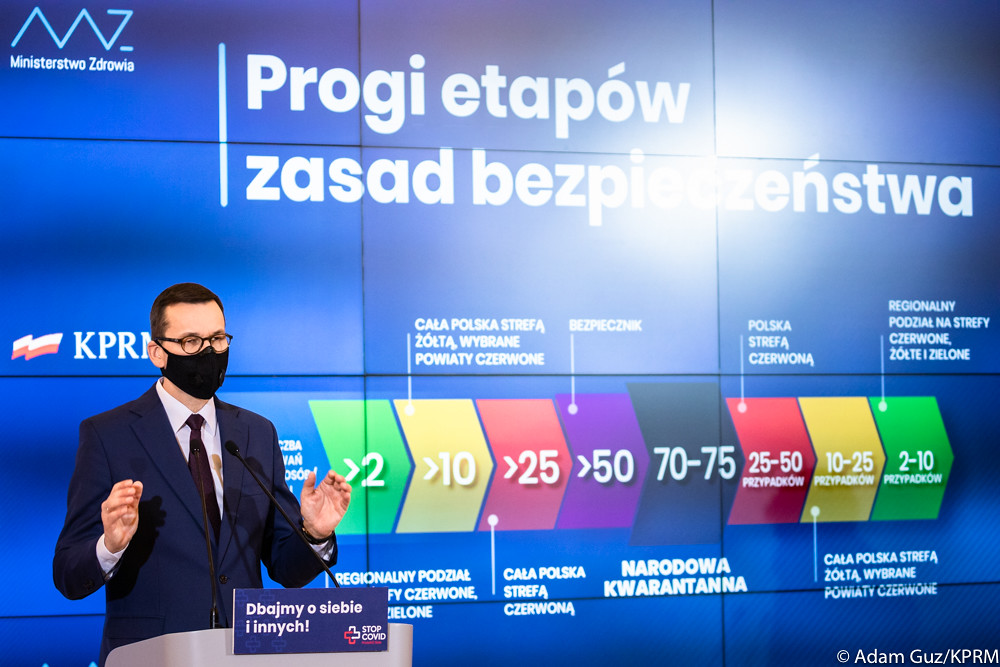The Polish government has announced a further tightening of nationwide restrictions in its bid to halt a rapid rise of coronavirus infections, as Poland today again recorded its highest ever daily figures for new cases and deaths.
Among the major changes (outlined in full below) are that all school pupils will now be learning from home, while cultural institutions and many shops are to close.
The prime minister, Mateusz Morawiecki, warned that today’s measures were the “final stage before national quarantine”, and that if the number of cases continues to rise then the next step would be full lockdown.
Morawiecki also urged people to stay at home where possible and pointed the finger at those attending mass abortion protests, which began 12 days ago, saying that large gatherings had been a contributing factor to the increasing spread of the virus.
Nowe kroki w walce z koronawirusem – ostatni etap przed narodową kwarantanną.
➡️Czytaj więcej: https://t.co/NtTZv0hhr3 pic.twitter.com/cTw2Jcdkjj
— Kancelaria Premiera (@PremierRP) November 4, 2020
In addition to restrictions introduced previously, which had restricted or closed many schools, businesses and leisure facilities, the government today announced that:
- Children in Years 1-3 of primary school will join older pupils in moving to remote learning.
- Cultural institutions (theatres, cinemas, museums, art galleries, etc.) will be closed completely.
- Attendance at churches will be further restricted to 1 person per 15 square metres.
- Stores in indoor shopping centres will be closed, except those selling food, toiletries and cosmetics, medical and pharmaceutical supplies, DIY items, products for animals, press or offering services (such as dry cleaning and key cutting).
- Shops below 100 square metres in size will be limited to 1 customer per 10 square metres, and those over 100 square metres to 1 customer per 15 square metres.
- Hotels will only be open to those travelling for work purposes.
The restrictions all go into force on 7 November and apply initially until 29 November, including remote learning for school pupils. Older children will also continue to learn from home until at least that date.
The prime minister also announced a voucher of 500 zloty (€110) available for every teacher to subsidise the purchase of electronic equipment essential for remote education, and promised that the government would try to provide further support for businesses in the restaurant, tourism and fitness sectors affected by the restrictions.
The health minister, Adam Niedzielski, speaking alongside Morawiecki, admitted that the health service is at the “limits of its capacity”. This necessitates action to cut the infection rate.
“We cannot afford to look short-term and make light restrictions,” said Niedzielski. “This is the time for the emergency brake.”
“Above all, stay at home, to avoid giving the virus the chance to spread,” he added. “Let us only go outside when it is necessary and essential. Applying the DDM rule [Disinfection, Distance, Masks] really must be the standard now.”
Both Morawiecki and Niedzielski blamed the current protests against a ruling that introduces a near-total ban on abortion – which are believed to be the largest demonstrations in Poland’s post-communist history – for exacerbating the spread of coronavirus.
“The protests have led to an increase in the numbers of infections,” said the prime minister. “This is not the time for strife, for ideological quarrels,” the health minister added.
Morawiecki also warned that a full lockdown could be introduced within ten days if the new restrictions do not reduce cases numbers. He presented graphics showing the stages of increased lockdown levels depending on numbers of infections at national and local level.
Premier Morawiecki przedstawił etapy lockdownu pic.twitter.com/CjzE7gfdFs
— Rzeczpospolita (@rzeczpospolita) November 4, 2020
Announcing the previous set of restrictions 12 days ago, the prime minister had promised that they would have an effect within 10-14 days. Poland’s rate of infections has almost doubled since then.
Today, the health ministry announced 24,692 coronavirus infections – almost 3,000 higher than the previous daily record – and 373 deaths of people infected with the virus, which is also the highest ever recorded.
At the start of this week, Poland had the fourth highest number of COVID-19 deaths (in proportion to population) in the EU over the last seven days.
The government has been stepping up its efforts to help Poland’s health service, which is struggling to cope with the soaring infection rate. The government is seeking to attract over 1,000 doctors from abroad, mostly from Ukraine and Belarus, and medical staff already tackling the pandemic will have their salaries doubled.
It has also completed the construction of a temporary hospital at the National Stadium in Warsaw, and tasked state-owned companies with helping create further ones in other parts of the country.
Main image credit: Adam Guz/KPRM (under CC BY-NC-ND 2.0)

Ben Koschalka is a translator, lecturer, and senior editor at Notes from Poland. Originally from Britain, he has lived in Kraków since 2005.




















